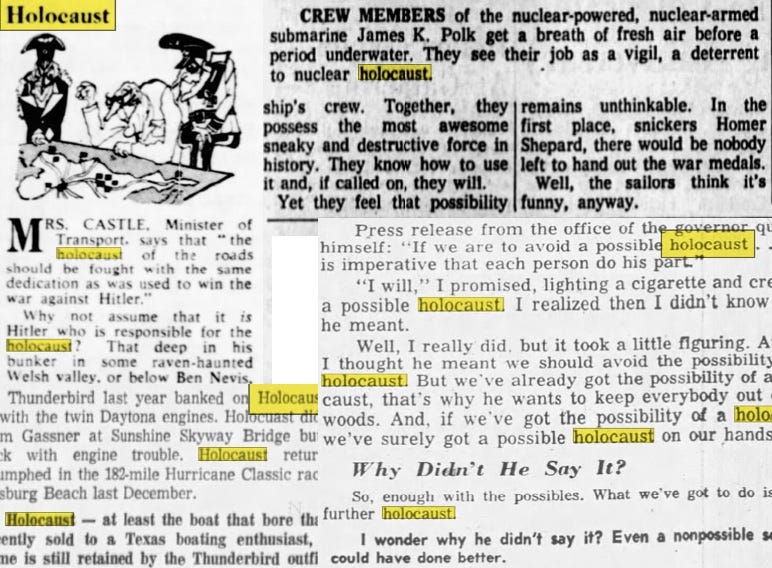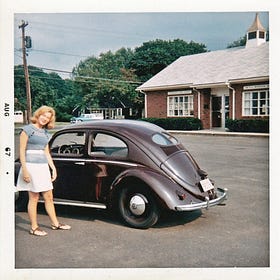Introduction to the post-60s Holocaust Revival
Transed and Nationless: The Post-Hitler West - Explaining the last three years as the diminishing cultural salience of the Holocaust, Pt 2.
Series notes
Comments on this series will be occasionally pruned for uninterestingness or evident failure to read and reply to the thesis itself. (Anything heavily centered on Jewish “machinations” in modern cultural and political affairs will probably merit removal on those grounds.)
Continued from Part 1, which clarifies my position on Holocaust “Denialism” (I do not deny the Holocaust, but I insist that my understanding of what it was be based on normal historiographical standards, grounded in evidence and open to revisionism; anyone should do the same, the Holocaust should not be understood with a “special kind of history” the way children are given special scissors lest they harm themselves):
In part 2: Why did the “Comic-Book” version of the Holocaust come to function as the post-60s West’s (especially America’s) creation-myth?
Disclaimer: “Holocaustianity” and originality
This post depicts the rise of a cultural-religious phenomenon in America. Others have researched and written on this topic before, and the term which describes it pre-exists this post. While as a late-comer to this subject I expect to repeat many of the same points, it is nonetheless the case that unless cited otherwise, everything here was based on direct research of primary and secondary sources from before 1990 and is not a repackaging of someone else’s work.
“No one is interested in Hitler.” — (early 1950s)1
As late as 1961, the holocaust by any name was not yet regarded by American publishers as a subject of sufficient interest...2
“Oh yes, I remember the trial of the war criminals,” he said spitefully. “Look how many wars there have been since! And have there been any more Nuremberg trials? Why did everybody pick on us?” — (1966)3
A generation has passed since Auschwitz and Dachau, a generation that chose to be silent and spare its children the horrors of those names. Now, the children want to know. — (1976)4
“The turning of the murder of European Jewry into a paramount symbol of what it means to be a Jew presents altogether too simple and too repulsive an account of reality.” — (1980)5
The devastating barb: “There’s no business like Shoah business” is, sad to say, a recognizable truth. — (1981)6
ii. The West’s New Religion
In 1966, as America lurched into the Vietnam War, 150 of the reporters who had attended the Nuremberg trials 20 years before were invited to a Polish-organized conference to discuss the problem of the West’s forgetting of the Holocaust. 25 non-Polish reporters showed up; “7 Russians, 7 Frenchmen, 5 Britons, 3 Czechs, a Hollander, a Yugoslav,” and 1 American. He wrote:7
I was pleased that someone had thought the trial anniversary worth marking , For 11 months in 1945-46 the Nuremberg courthouse had commanded major headlines in a shocked world press: for a few years after that, lawyers and journalists (myself included) had published appraisals of what took place there. After that came a period of forgetting — a forgetting so complete that an American president could go before a crowd of roaring Germans and say, apparently quite without reservation or inhibition, Ich bin ein Berliner. [This was Kennedy, in 1963.]
At the same time, ostensibly “de-Nazified” War-era West Germans were openly participating in an organic political movement of “re-Nazification” — the recently-founded National Democratic party “marched to the polls last November, and a former Nazi was elevated to the chancellorship at Bonn.”8 The Holocaust had been forgotten throughout the West, and West Germans saw no intrinsic difference between their own war crimes and others which had continued to take place in the last 20 years.9
The phrase “holocaust” itself in 1966 had only recently been appropriated to describe the displacement and murder of Europe’s Jews in the Nazi era,10 but in common use in the UK and US was still a generic term applied in newspaper headlines and copy without any dissonance to nuclear war, chaotic traffic, as the name of a racing boat, or used simply to parody a local politician’s grammar.11

Yet by 1980, “the Holocaust” was an American household name and Holocaust remembrance was suddenly the sprawling cultural and political phenomenon that we recognize today.
It was (in tandem with the founding of Israel) “the central myth by which American Jews seek to make sense of themselves;”12 ABC had broadcast a four-part movie about the era; gas chamber recreations were broadcast on the TV and conducted in schools, with children “locked in small rooms”;13 it was the “subject of scores of books, lectures, courses, television programs—even a children’s game;”14 President Carter had commissioned a national council for the creation of a Holocaust memorial; politicians were regularly “bestowing [Holocaust-related] awards and punctuating their speeches to Jewish audiences with frequent references,” and even Jewish intellectuals and media bemoaned “the growing ‘Holocaust industry’” which, via “Fund raisers… soliciting support for purposes which are often vague and undefined,”15 was directing “the allocation of sizable sums to the creation of new Holocaust centers in universities and communities throughout the country.”16
The Holocaust was a modern American cultural and political obsession without obvious par before the year 2020. Its rise coincided with and simultaneously overshadowed religious awakenings within both American Judaism and Christianity, and while those awakenings were already in their twilight, obsession with the Holocaust was only in its dawn — the true Hollywood-ification of the Holocaust was yet to even begin. As Ron Unz points out in his own discussion of Holocaust Denialism, there are now so many dramatizations that we can simply rank the best ones.17

All this cultural transformation was achieved a mere 14 years after the nightmarish epoch had been totally forgotten. What changed?
Next in series:
The Forgetting of the Holocaust
Series notes Comments on this series will be occasionally pruned for uninterestingness or evident failure to read and reply to the thesis itself. (Anything heavily centered on Jewish “machinations” in modern cultural and political affairs will probably merit removal on those grounds.)
Also:
Part 1: Introduction; RE Holocaust “Denialism” ↗
Part 4: 1967-1980: The recalling of the Holocaust ↗
Part 5: Background trends during the “Holocaustianity” era ↗
Part 6: The need for new sacrifices 2017-pres. ↗
Quote of an “American Jewish historian” giving advice to a graduate student in the early 1950s, from
Jick, Leon A. “The Holocaust: Its Use and Abuse Within the American Public”, Yad Vashem Studies, vol. 14 (Jerusalem, 1981) At nli.org.il
ibid.
The quote continues, “… to warrant a possible financial risk,” which is a bit over-detailed since (in my reading) it is only describing rote business considerations and not secondary risks (e.g. backlash of some sort), as no such hazards prevailed at the time. Therefor I left that clause out.
Bernstein, Victor H. “Guilt: Second Look at Nuremberg — Where Aggression Was Tried.” Charleston Sunday Gazette-Mail. (January 29, 1967.) Reprinted from The Nation. At newspapers.com
Karasik, Ellen. “Holocaust.” Columbus Ledger-Enquirer. (November 25, 1976.) p. E-12. (Syndicated on many papers by Knight News Wire.) At newspapers.com
Jacob Neusner, quoted in Hyman, Paula E. “New Debate on Holocaust: Has Popularization of the Tragedy Diminished Its Meaning and Diminished Other Aspects of Judaism?” St. Louis Jewish Light. (November 19, 1980.) (Syndicated from New York Times.) At newspapers.com
(Jick, Leon A.)
(Bernstein, Victor H.)
ibid.
Bernstein interviews a middle-aged Nuremberg resident he meets in the parking of the courthouse. This is the source of the “Why did everybody pick on us?” quote in footnote 3.
(Jick, Leon A.)
Transference of the term in earnest seems to have been stimulated by the Eichmann trial, in 1961. A new definition of “holocaust” referring to the “destruction of the European Jewry in World War II” appeared in the Barnhart Dictionary of New English in 1963.
In my own research, newspaper references to “holocaust” (as the Holocaust) increase in the late 60s as a result of interest in Elie Wiesel’s works, with the term frequently in quotation marks. Even in 1972, a Boston Globe headline describes Jewish students as originating a “course on Hitler ‘Holocaust,’” (newspapers.com) indicating the phrase still has ambiguous connotations.
Sampled 1966 papers:
nuclear war https://www.newspapers.com/image/240807125/
road chaos https://www.newspapers.com/image/822050992/
racing boat https://www.newspapers.com/image/316704430/
“possible” quibble https://www.newspapers.com/image/316219959/
Jacob Neusner, quoted in (Hyman, Paula E.)
(Hyman, Paula E.)
[Elie Weisel] is appalled by the fact that well-meaning teachers think they have conveyed to children by locking them in small rooms to simulate gas chambers. And he holds the mass media responsible for making these misuses of the Holocaust seem legitimate. When he asked one teacher why she used simulation techniques, he was told, “If NBC could do it, if they could create fake gas chambers for their audience, why can’t we do it for children?”
(Jick, Leon A.)
(Jick, Leon A.)
(Hyman, Paula E.)
Unz, Ron. “American Pravda: Holocaust Denial.” (August 27, 2018.) unz.com








We should remember the Nazi Holocaust. It was a genocide.
We should also remember the Soviet Holodomor in Ukraine, in which as many as 7 to 10 million people died. That, too, was a genocide.
http://www.ukrweekly.com/archive/pdf3/2003/The_Ukrainian_Weekly_2003-46.pdf
We should also remember the Armenian Genocide of WW1.
https://www.britannica.com/event/Armenian-Genocide/Genocide
We should also remember the ethnic cleansing in Bosnia in the mid 1990s.
https://archive.is/20120525111049/http://www.worldlii.org/int/cases/ICTY/2001/8.html
By far the most appalling aspect of the Nazi Holocaust is that it does not stand alone as a 20th century examplar of man's inhumanity to man, but that there have been numerous such barbarities before and since--the genocidal persecutions of the Rohingya in Myanmar and the genocide of the Uyghurs in China are but the latest exemplars of this evil.
It is worth noting that the USC Shoah Foundation seeks to move the conversation beyond just the Nazi Holocaust, and has documented the experiences and witness testimonies from contemporaneous instances of genocide that are taking place even now.
https://sfi.usc.edu/what-we-do/collections
The horror of the Holocaust is that it was never an isolated moment of barbarism. It has been repeated since, and is being repeated now.
In the old Catholic liturgy in Latin until Vatican Ii, in each Mass, the Holocaust was mentioned as the self sacrifice of Christ, Christ being a victim, in the Eucharist. After Vatican II, there only was mention of the Last supper, the meal aspect of the Eucharist. No more clear indication of transsubstantiation and especially no more mention of the full sacrifice, holocaust which came from the Old Testament. In 1978, when the Holocaust tv series started, that Holocaust was the only meaning people were confronted with. No more holocaust in Church every Sunday.